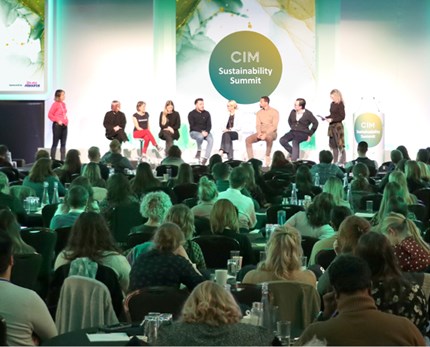Marketing’s vision for the circular economy

- 24 June 2022
James George, a strategic advisor at PYREXA Global, took to the stage at CIM’s inaugural Sustainability Summit to explain the importance of the circular economy and why foresight is crucial for the widespread adoption of sustainable business practices. After his talk, James shared his thoughts exclusively with CIM’s content hub on his vision for the circular economy and the crucial buy-in needed to make this dream a reality.
It is a very human trait to consume, but as James voiced at CIM’s Sustainability Summit, as a society, "we’ve normalised consumptive behaviour and a consumptive attitude to growth." James continued, "To […] keep the economy growing, we have to take more resources out of the ground, we have to make them into all the different and marvellous products that we see in the world around us, and when they’re no longer needed, we throw them away.".
It is clear from what James says that our attitudes and practices as a society are in urgent need of total re-assessment. Something that James was very clear on is that sustainability shouldn’t be about an anti-growth business model; instead, it should focus on finding a different way to look at business growth:
"It’s not anti-growth, it's just a different kind of growth, a growth that’s restorative and regenerative. It’s about looking at the bits of the economy that are growing, whether that's through new green industries, whether it's through new green jobs, whether it's through innovation of existing products, or new technologies that enable us to answer some of these questions.".
Addressing the issue of maintaining economic growth through production and consumption from an oppositional standpoint, and asking how we can enable consumption that leads to a restorative and regenerative type of economic growth, re-frames the problem entirely. This offers the possibility of a world where consumption is not just used as a tool to drive growth in the economy, but where consumption of specific products actually negates damaging effects on the planet.
"We talked a lot today about the circular economy. But ultimately, this isn't necessarily about calling something one label or not. It's about how we create systems that work and systems that endure and work for everyone."
From what James says, it is clear that foresight is going to be an integral aspect of the way we, as a species, proceed. Careful planning and consideration are going to be key to the creation of systems which will have value and longevity for consumers and the planet. The idea of restorative and regenerative growth, referred to by James during his talk as "the right kind of growth" is very exciting, and it turns the traditional idea of sustainability on its head.
Creating these systems, and with them, changing the entire industrial landscape is going to be an enormous challenge, also one which we need to begin addressing immediately. The sheer scale of this challenge makes it an intimidating task. So how do we begin to create these systems? James' advice? "We need to make sure we've got the right partners.".
So, who are the right partners? What kind of buy-in do we need to make this happen?

First and foremost, James says, ‘they're the ones that are going to realise and operationalise this agenda.’ In effect businesses are already in the best position to contribute to this paradigm shift, as they have the means of production, they have the capital, and they have the people on the payroll to make it happen. As James says, "businesses are the engines of our economy.".

In order to make the circular economy a reality, it is essential to have leadership from policymakers and by extension, the government. It is their responsibility to "create the right conditions that enable those new business models and those new innovations", James believes. Without the right business environment, the incentive for firms to focus on more sustainable practices is simply not there.

The research and development behind a comprehensive shift away from our current model needs to be backed up by cold hard data, which needs to be well researched and verified. Academics are well suited to be able to "tell the scientific story, to corroborate the data, to bring that forward", James says.

When it comes to businesses, James believes that older organisations can be clunky and in-agile. He goes on to say that those most well suited to meet the sustainability challenges of today are the innovators. He continues, "Your innovators are agile, they're able to move quicker, they're able to adapt quicker, and they can help large organisations, change their technology, change their processes.".

Simply put, without us as a species being on board, all of these stakeholders, no matter their size and power, will still fail to stem the tide without the widespread adoption of this new way of thinking. George believes each of us has power and as a collective, we have a great deal of power to change the world.
If these stakeholders can come together in a meaningful way, creating an atmosphere conducive to a shift in attitude towards production techniques and unnecessary consumption, there is a huge opportunity. This presents a chance for businesses and entrepreneurs alike to completely change the present state of affairs for the better.
Surprisingly, the kind of systems to which James refers are already beginning to come into existence, with a myriad of technological breakthroughs taking place around the world. As an example, James shared with delegates a unique, bioinert packaging material made by a company called Ooho, a compound extracted from seaweed. This product was used in place of traditional bottles by Lucozade at the London Marathon, resulting in a reduction of 30,000 single-use plastic bottles at the event. a compound extracted from seaweed. This product was used in place of traditional bottles by Lucozade at the London Marathon, resulting in a reduction of 30,000 single-use plastic bottles at the event.
When asked what we as marketers can do in order to drive this mindset forwards, James urged professionals today to focus on communication and education:
"The key thing, especially when we think about the context of marketing, is telling those success stories and telling the success stories in a way that allows you and I, our parents, our friends, our family, to understand that in real terms. This, like any concept, is just full of words full of very, very complicated scientific and theoretical thinking. But what does that mean to the average individual? If I can explain it to my dad, I can explain it to anyone and so how do we tell those stories? That’s where the event like today really comes into its own. How do we make sure we construct those stories in a way that they're accessible? Consumable, but consistent.".
Do you know a company who are putting the planet at the heart of their organisation? Perhaps you have a sustainability success story you’d like to share yourself? Join the CIM Sustainability LinkedIn group today and continue the conversation with our community. You can also catch up with James George’s full presentation from the Sustainability Summit and his behind-the-scenes interview on CIM’s Content hub.

- 0 views

 FAQs
FAQs
 Log in
Log in
 MyCIM
MyCIM






